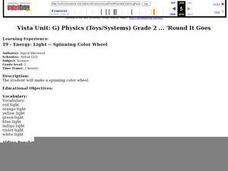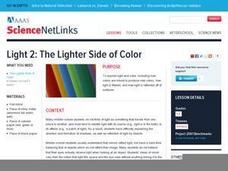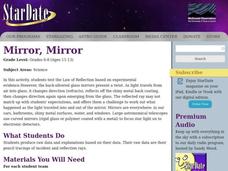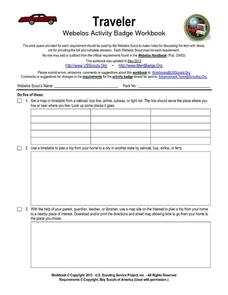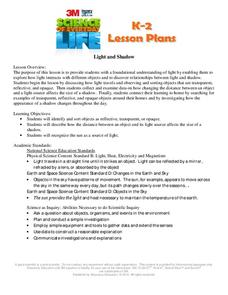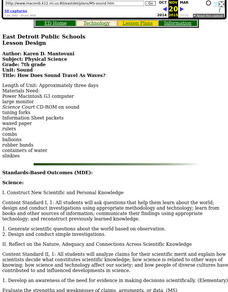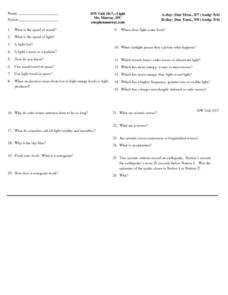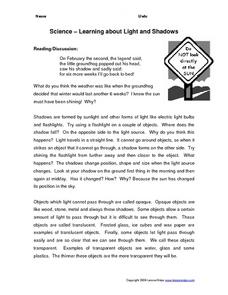Curated OER
Light
Students observe how light can be reflected, refracted, and absorbed. In this light lesson, students discover that light travels in a straight path. This lesson contains a "bonus" activity that explains how to make a kaleidoscope.
Curated OER
Energy: Light -- Spinning Color Wheel
Second graders make spinning color wheels to determine how energy effects what colors look like. They paint or color a color wheel with the seven colors of the spectrum. Next, the spin the wheel to determine what happens. In order to...
Curated OER
The Lighter Side of Color
Students explore light and color, including how colors are mixed to produce new colors, how light is filtered, and how light is reflected off of surfaces. They read materials provided, complete worksheets, and complete hands-on activities.
Curated OER
An Introduction to Light Unit-Third Grade
Third graders are introduced to light in an eight part unit which includes activities, additional resources, and rubrics for each part. Students address topics such as energy, reflection, absorption, and refraction through hands-on...
Curated OER
Mirror, Mirror
Students investigate the Law of Reflection and how light travels. In this reflection lesson students produce data from their experiment then create a pencil tracing.
Curated OER
Traveler: Webelos Activity Workbook
This three-page worksheet is designed to be used by the Weblos of Boy Scouts of America. They are given 13 choices of academic activities that involve the use of maps, geography, math, and money. They must complete five of the activities...
Curated OER
Innovation: Light Speed
Get your scholars working at "light speed" with this activity on how different wave frequencies have been discovered and used. The assignment has 20 short-answer questions, set up in a table. Consider re-doing the table or allowing high...
Curated OER
In a Galaxy Far, Far, Far Away
Sixth graders compare distances between objects in the solar system. They investigate how light years are measured and when using them to measure how distances compare with one another. They write an essay exploring the possibility of...
Curated OER
Light and shadow
Young scholars experiment with light and shadow. In this light lesson, students look at the relationship between shadows and light. They experiment with light source, shadow size, transparent objects and reflective objects.
Curated OER
Distances in Space
In this distances in space worksheet, students learn about astronomical units and light years as measurements for great distances. Students use both of these units of measurements to solve five problems.
Curated OER
How Does Sound Travel As Waves?
Seventh graders participate in a number of activities designed to increase their understanding of how sound is generated and how it travels.
K12 Reader
What Causes Reflections?
Your kids probably use mirrors every day, but do they know how they work? A reading passage about reflection and reflective objects can address both physical science and reading comprehension. Kids read the paragraphs and use context...
World Health Organization
Sun Protection
Primary graders become sun scientists and conduct experiments to learn about the beneficial and harmful effects of the sun and UV radiation. They also investigate their personal sunburn danger zones and learn about how to protect...
Curated OER
Super Gelatin
High schoolers investigate the refraction properties of gelatin to calculate its index of refraction. They discover that as the light travels through the gelatin, its speed and wavelength also change. Students find th indes of refraction...
Curated OER
Speed of Light
In this speed of light worksheet, students read about Danish Astronomer ole Roemer and his discovery of the speed of light. Students complete 4 short answer questions based on the reading.
Alabama Learning Exchange
How Are Rainbows Created?
Students describe how the sun's rays produce colors. They describe how water causes the sun's rays of light to bend, producing a rainbow.
Curated OER
Journey, Travel and Trip Exercise
In this journey, travel, and trip worksheet, students fill in the blanks to the sentences with either the words journey, travel, or trip. Students complete 17 sentences and write 4 on their own.
Curated OER
Measuring the Speed of Light
Students explore physics by completing measurement problems in class. In this speed of light lesson, students discuss the importance of knowing the speed of light and how it affects many aspects of human life on Earth. Students identify...
Curated OER
HW Unit 10:7-Light
In this light worksheet, learners answer twenty six questions about sound and light and how they both travel. They also answer questions about different types of waves in the electromagnetic spectrum such as radio waves, visible light,...
Curated OER
Online Exploration: Telescopes From the Ground Up
Learners explore a web-based illustrated text and interactive graphics to determine the relationship between the operation of telescopes and light. optics. They work in small groups to become an expert on one of the ten eras of telescope...
Curated OER
Algebra: Mirror, Mirror on the Universe
Students assess how algebra, telescopes, space exploration and optics are so important in astronomy. They encounter studies on the Hubble Space Telescope, Hubble Deep Field and how algebra helps to determine the effects of contamination...
Curated OER
Science--Learning About Light and Shadows
In this light and shadows worksheet, students find 5 transparent items and 5 opaque items from the classroom and categorize them underneath their appropriate headings. Students look at 4 boxes with shadows and draw a little sun to show...
Curated OER
The Energy of Light
Young scholars discuss different ways engineers use light. In this engineering lesson, students are introduced to the properties of light and the way light is used. They view a demonstration of light waves using a slinky, and practice...
Curated OER
How Far...How Powerful
Learners explore the concept of gamma ray bursts. They examine basic physics concepts about light, measure the shifts of spectral lines, and utilize Hubble's Law to deduce the velocity of an astronomical object.



